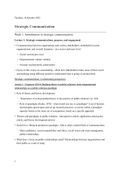Tuesday, 18 October 2022
Strategic Communication
Week 1: Introduction to strategic communication
Lecture 1: Strategic communications, purpose, and engagement
• Communication between organisations and various stakeholders, embedded in social,
organisational, and societal dynamics - on a micro and meso level
- Social: stereotypes, trust
- Organisational: culture, identity
- Societal: mediatization, polarization
• Focus on this course on sensemaking - about how stakeholders make sense of their social
surroundings using different models to understand what is going on around them.
Strategic communication: A relationship perspective
Article 1 - Ferguson (2018) Building theory in public relations: Inter-organisational
relationships as a public relations paradigm
• Role of theory and theory development
- “Importance of well-grounded theory to the practice of public relations” (p. 165)
- Role of paradigms (Kuhn, 1070) - what would you say is a paradigm? A set of theories
and thoughts agreed upon and set up research practices, everyone within a paradigm
operates based on the same set of assumptions, based on a specific approach
• Themes and paradigms in public relations - introspective article, application and practice
article, and theory development articles
• Search for a fitting & productive paradigm - link to other, related fields of communication
- Main candidates: social responsibility and ethics, social issues and issue management,
public relationships
• What does a focus on public relationships entail? Relationships between organisations and
their public as a unit of study
1
,The green unicorn: building blocks
Organisation < public relationships > publics
Brainstorm in groups: What could be relevant research questions from a public relations
perspective?
Some critical notes
• Too focused on PR, there are benefits to interdisciplinary research too
• Focus on one journal
• Degree of subjectivity
Conclusions and learnings
• Status quo on the field
• Relationships as a fruitful paradigm for the field … open for academic debate BUT also for
THIS COURSE
Compare…
• Corporate communication is defined as “A management function that offers a framework
for the effective coordination of all internal and external communication with the overall
purpose of establishing and maintaining favourable reputations with stakeholder groups
upon which the organisation is dependent” (Cornelissen, 2011)
• “Strategic communication focuses on how the organisation itself presents and promotes
itself through the intentional activities of its leaders, employees, and communication
practitioners” (Hallahan et al., 2007, p.7)
2
,Article 2 - Lee & Kee (2017) Testing an environmental framework for understanding public
relations practitioners’ orientation toward relationship management
• Public relations is “a management function that establishes and maintains mutually
beneficial relationships between an organisation and the public on whom its success of
failure depends” (Broom & She, 2013)
• A relationship is “the state which exists between an organisation and its key publics, in
which the actions of either can impact the economic, social, cultural or political well-
being”
• Organisation-public relationships (OPRs) are “transactions that involve the exchange of
resources between organisations … and lead to mutual benefit, as well as a mutual
achievement” (Broom, Casey, & Ritchey, 1997, p.91)
Relationship management theory (Ledingham, 2003, p. 195)
• Relationship management theory is how “effectively managing organisational-public
relationships around common interests and shared goals, over time, results in mutual
understanding and benefit for interacting organisations and publics” (Ledingham, 2003, p.
190)
• Axioms - ‘based on the collective findings from the literature review, the following axioms
of organisation-public relationships are offered’
3
, Testing an environmental framework
• Key relationship concepts are trust, control mutuality, satisfaction, commitment, exchange
relationships, and communal relationships > which lead to relationship management
orientation
• Environmental factors (the main focus of this research) are political systems (i.e. degree of
democracy), economic systems (i.e. economic development and freedom), media systems
(i.e. media freedom), degree of activism, and culture
Main findings
• Perceived degree of democracy is the most influential environmental factor and to some
extent also economic systems can have an impact on the environment
Limitations
• The sample size is very small and it only used universities website, which is not a
representative sample
Lecture 2: Communication as organising principle for strategic communication -
Sensemaking and discourse
Conceptualisation of sense-making
Cultural turn
• Shift from mechanical to organic perspective
• More attention to qualitative research and meaning-making processes
• The organisations as the product of communication > constitutive view of communication
4




